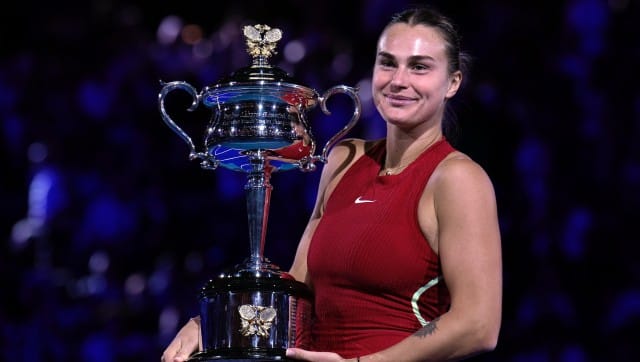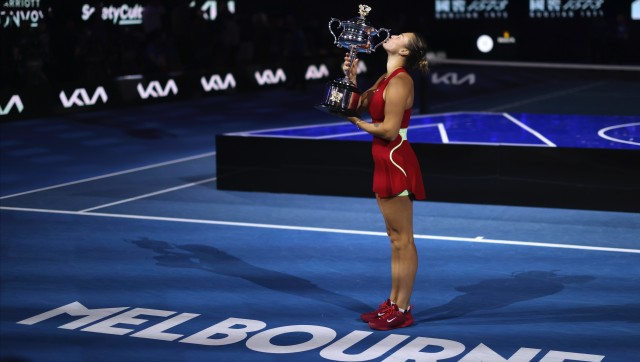After the US Open final loss to Coco Gauff, Aryna Sabalenka couldn’t hide her disappointment. She felt it was she who had let the match slide than Gauff had taken it from her. “The good news is that it’s me against me,” Sabalenka said at the time. “The bad one is that I’m still having these issues playing against myself, I would say. But it’s OK. I’ll work harder so next time I’m not going to get even a little bit tired on court, and so I’ll be better.” The “next time” didn’t have to wait for long. At the Australian Open, she blitzed through the field , without dropping a set, to emerge as the first woman to defend the title since compatriot Victoria Azarenka in 2013.
Ella Siedel, Brendra Fruhvirtova, Lesia Tsurenko, Amanda Anisimova, Barbora Krejcikova, Coco Gauff and Qinwen Zheng stood opposite her and
only 19-year-old Gauff came close to taking a set
. Even then, Sabalenka looked to be running away with it in the first set before Gauff made a match of it. No one, including Zheng in the final, could take more than three games from her in a set. In all, she dropped just 31 games through the seven matches. “Actually it’s been in my mind that I didn’t want to be that player who won it and then disappeared,” Sabalenka said after her win. “I just wanted to show that I’m able to be consistently there and I’m able to win another one. I really hope more, more than two, but for me it was really important. “That’s why, no matter what the result, win or lose, we are always working hard, we were always looking for things to improve in my game. It’s all about the process and make sure that, about the discipline, make sure that you’re always there, you always show up, and you always work hard.” [caption id=“attachment_13660702” align=“alignnone” width=“640”] Aryna Sabalenka holds the Daphne Akhurst Memorial Cup after defeating Zheng Qinwen to win the Australian Open title for a second year running. AP[/caption] Sabalenka’s second Grand Slam title brings her tennis prowess alongside a more relaxed mentality and discipline. It also brings in a mature attitude and growth to her tennis. The Belarusian struggled with her serve just two years ago. In 2022, she sent down a staggering 428 double faults in 55 matches, at an average of 7.78 per match. That year in Melbourne
she served 21 double faults
in one single match. The serving quips are a thing of the past. During the fortnight, she served just 10 double faults and won 69.47% of her serve points. “Definitely that year when I was struggling a lot helped me a lot to understand that, even if my serve is not working, I’m able to fight for it, and I have good return,” she said.
Aryna Sabalenka holds the Daphne Akhurst Memorial Cup after defeating Zheng Qinwen to win the Australian Open title for a second year running. AP[/caption] Sabalenka’s second Grand Slam title brings her tennis prowess alongside a more relaxed mentality and discipline. It also brings in a mature attitude and growth to her tennis. The Belarusian struggled with her serve just two years ago. In 2022, she sent down a staggering 428 double faults in 55 matches, at an average of 7.78 per match. That year in Melbourne
she served 21 double faults
in one single match. The serving quips are a thing of the past. During the fortnight, she served just 10 double faults and won 69.47% of her serve points. “Definitely that year when I was struggling a lot helped me a lot to understand that, even if my serve is not working, I’m able to fight for it, and I have good return,” she said.
“Right now when I’m serving a little bit better than that year, definitely I feel more controlled on my serve. Even if I’m down in the score in my serve or even if someone breaks me, I am not getting crazy like I used to, and I have this belief that no matter what happen, I’m able to fight for it. I have a lot of weapons, not only my serve.” 20 days ago, a title win looked to be a distant possibility. At the Brisbane International, Elena Rybakina crushed her 6-0, 6-3 in the final. “First of all, Elena, whoa,” Sabalenka laughed. “That was an interesting match. Thanks for those three games. At least we made it look like a fight,” she continued. That accurately defines the persona of a new-and-improved Sabalenka. There’s a steely resolve on the court where she looks physically hurt upon missing shots. And then there is the off-court personality where she jokes during the post-match interview, laughs out loud often in the press conference and absurdly, signs performance coach Jason Stacy’s head as a ritual.
“It’s actually good that I’m two different people on and off the court, because if I would be the same person that I’m on the court off the court, I think I wouldn’t have my team around me, and I think I would be alone,” she said, laughing. “But it takes me so much time to kind of like become who I am right now on court, to have this control (of) myself, and to understand myself better. It’s been a long journey and way to go.” The dramatic change has been brought upon with the help of her coaches and a sports psychologist. “When you’re working with a psychologist at some point it’s really helping, especially for young players,” she said.
“But then at some point you start kind of expecting somebody to help you. You know, you’re not fixing your problems by yourself. “I just decided at some point I need to figure out by myself how to start to control myself better. “And I think that decision was the biggest decision for me and I started actually taking responsibility for everything I’m doing, and it’s really helped me to become more controlled on court.”
Tanuj Lakhina wishes there were more hours in the day for sports to be played and watched.
)